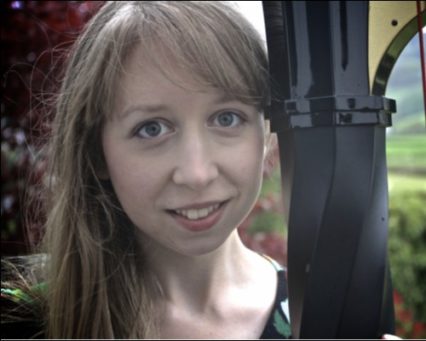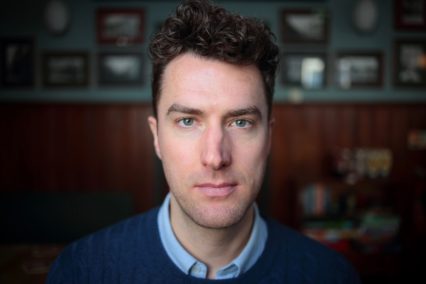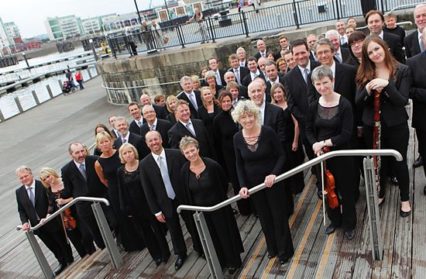BBC National Orchestra of Wales
Soloist: Chloë Hanslip (violin)
Conductor: B Tommy Andersson
Simon Holt: St. Vitus In The Kettle; An Icicle Of Moon
Mark Bowden: Three Interludes
B Tommy Andersson: Violin Concerto (Homage to Michelangelo)
Alun Hoddinott: Dragon Fire
Mared Emlyn: Porthor (Whistling Sands)
Hoddinott Hall, Wales Millennium Centre, Cardiff, 21 February 2018
The most prosaic acknowledgement of inspiration at this concert came from the oldest composer. Not that (the late) Alun Hoddinott’s enthusiasm for the BBC NOW’s kitchen department was his only impetus for Dragon Fire, a work lightly masquerading as a percussion concerto and written in 1998 to mark the orchestra’s 70th birthday. An important part of the BBC NOW’s 90th anniversary celebrations this year will continue to reflect the high regard in which it has been held by composers who have been formally associated with it. Conductors, too. In the case of Hoddinott, whose later career coincided with the orchestra’s accelerated development, the connection was intimate. He told me a few years before he died that, beyond the BBC Symphony Orchestra, it was the best BBC house band ‘and swiftly becoming better than that’. The Tardis-like portion of the Wales Millennium Centre where this concert took place was named after him and inaugurated in 2009 as the orchestra’s principal recording space, doubling as a public concert venue.

Anniversaries and celebrations can be heady and diverting affairs, and so it was with this concert, which appeared to consist of items chosen at random. Apart from Hoddinott, the other composers represented were Simon Holt (whose 60th birthday it was) and B Tommy Andersson, former composers-in-association with the orchestra; Mark Bowden, a past composer-in-residence; and Mared Emlyn, sole representative of a hugely significant distaff side in Welsh composition.
Most composers today would not refuse an offer to work closely with a symphony orchestra and write for it, but it would not be everyone’s favourite medium: economies of scale can easily translate into artistic and practical preferences. Hoddinott appeared to have shown the way with the full orchestra panoply at his disposal, but Dragon Fire’s title promises more than it delivers. As a concertante, with the orchestra’s long-serving timpanist Steve Barnard the centre of attention and his colleagues leaping about twixt sundry hammered items, wind machine and thundersheet, it appears formless, any conventional structure being obscured by not-very-meaningful sub-divisions. What sets in, therefore, despite some memorable writing for strings, is extension without a great deal of purpose, a feeling that Hoddinott’s familiar sense of companionless brooding only exacerbates. That wind machine can represent a blasted heath or an excuse for dusting down a rarely-used object in the batterie de cuisine.
With a full complement in place, it was the turn of Mared Emlyn to show in her 2015 Bangor Music Festival commission, Porthor (Whistling Sands), how even an understandably tentative exploration of what an orchestra can do encourages the marginally outstayed welcome. The work is inspired by the North Wales beach of the title, where, if conditions are right, the sand will ‘squeak’ under your feet.

In some places, Emlyn notes, the phenomenon is called ‘the singing sands’. Whistling, squeaking, singing – it’s all music to her ears, and she reflects it in some circumspect thematic development involving woodwind, and notably trumpet, whose simple theme was the easiest thing Philippe Schartz played all night. The gathering together of these strands, underscored by percussion animato, might profitably have been accomplished earlier.
The experienced and prolific composer-conductor Andersson conducted a second performance (and a UK premiere) of his 2016 Violin Concerto, here given an authoritative reading by soloist Chloë Hanslip. Based on tunes he wrote for song settings of Michelangelo and diffused throughout by a more general love of the artist’s oeuvre, the concerto was the nearest thing to a throwback we heard all night, the active outer movements involving the soloist in some embattled, head-into-the-wind intensity relieved by a long central section in which the rhapsodic at last finds release in passages of great serenity.

Holt, too, had a UK ‘first’: the short, phantasmagorical an icicle of moon, based on a line from Lorca and commissioned by the Bamberg Symphony Orchestra for its catalogue of encores. This is night music of an eerie sort, the light timpani taps suggesting progression through an uncertain landscape. On the night, Holt’s music was like a bright light going on, if only briefly in this case. The concert opened with his St. Vitus In The Kettle of 2008, first played at the opening of Hoddinott Hall and written as though, offered an orchestra, the composer decided to dispense with all its strings except six double basses. His inspiration was the story of St Vitus, a 4th-century martyr who refused to propitiate the Roman gods and was ineffectually dunked in a vat of boiling lead for his trouble. It’s a theme that’s exercised Holt before, and in this case resulted in a sometimes splintering, sometimes simmering, piece, whipped along by thwacked basses. It’s thrillingly discomfiting, especially in the contrast between quietude (held chords) and uproar. Things happened.

More things will be happening around Bowden’s Three Interludes, a preliminary half of what he plans to include in the work he’s writing for Welsh National Opera (not much of it yet), about an undersea dystopia. Bowden thinks big narratively, as was evident in A Violence Of Gifts, the contemporary cantata he wrote for the BBC NOW three years ago. In the interludes, he is establishing his operatic soundworld, so they are a sort of work-in-progress of a work-in-progress. The last of the three, Fleet, depicts the submarine heroine’s furtive ascent to view the land, its single tune eddying across the orchestra. A stately melody in bottom strings and brass, spotted with fragments of another tune that then feature more acutely, portrays the woman’s appearance on a contaminated land in Shore; it’s not the idyllic state or place she expected. And the first interlude, The Deep, depicting the underwater world to which humanity has decamped, is limned with deceptive simplicity, which, in our benevolent moments, we sometimes ascribe to genius, especially as Bowden is experimenting with linked pitches and intervals. It’s all fluid and aqueous. There was a bit of that, too, in Emlyn’s work, as the strand incorporated the sea, particularly in her work’s fleeting echoes of Debussy.
Bowden dedicated the interludes to the memory of Eva Stewart, the orchestra’s ‘dazzlingly talented’ principal piccolo, who died suddenly last year. She was typical of musicians who not only take contemporary music in their stride but also give it the edge and clarity it needs. With minor exceptions, this programme was typical, despite its miscellany. Holt dedicated the performance of icicle to her as well.
Contemporary Evenings 2 is at Hoddinott Hall on March 28, with world premieres by Guto Puw and Mark Boden, alongside music by Alun Hoddinott, Sarah Lianne Lewis and Michael Berkeley.
Nigel Jarrett is a freelance writer and regular contributor to the Wales Arts Review. He is a poet, novelist, and story writer. His latest collection of stories, Who Killed Emil Kreisler?, was published in 2016. He is a winner of the Rhys Davies prize for short fiction and, two years ago, the inaugural Templar Shorts award. He also writes and reviews for Jazz Journal and Acumen poetry magazine. This year sees the publication of his short fiction pamphlet, A Gloucester Trilogy.



 Enjoyed this article? Support our writers directly by buying them a coffee and clicking this link.
Enjoyed this article? Support our writers directly by buying them a coffee and clicking this link.







